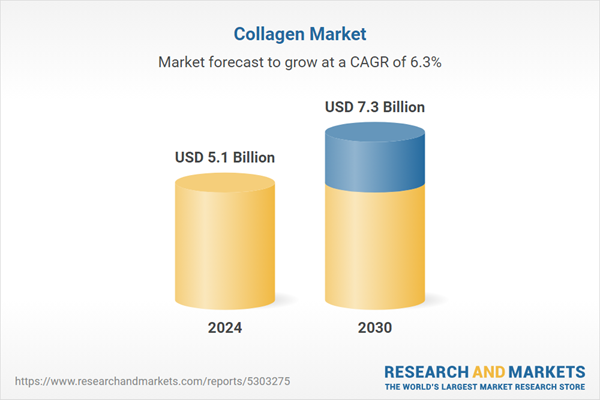Global Collagen Market - Key Trends & Drivers Summarized
Why Is Collagen Gaining Popularity Across Health, Beauty, and Wellness?
Collagen has become one of the most sought-after ingredients in health, beauty, and wellness, celebrated for its versatility and beneficial properties. As the body's most abundant protein, collagen plays a critical role in supporting skin elasticity, joint health, muscle recovery, and overall vitality. However, natural collagen production declines with age, leading to a surge in demand for collagen supplements and collagen-infused products to help counteract the effects of aging. Collagen is widely used in dietary supplements, skincare, functional foods, and beverages, meeting the needs of consumers looking for anti-aging solutions, stronger joints, and improved overall wellness. The rise of beauty-from-within trends has particularly driven collagen's popularity in both ingestible and topical forms, as consumers seek multi-functional solutions that address both aesthetic and health benefits. Additionally, collagen's appeal has expanded to younger demographics interested in preventative health, driving growth in collagen products for skincare, sports recovery, and more, making collagen a staple ingredient in modern wellness routines. The increasing awareness around preventive healthcare, combined with the consumer focus on natural ingredients, has reinforced collagen's reputation as a holistic supplement. Its versatility is also expanding its presence in various formats, such as powders, gummies, ready-to-drink beverages, and topical creams, catering to a wide array of preferences. Collagen peptides, a form of collagen that is easily digestible and bioavailable, have become particularly popular in dietary supplements, as they are believed to improve absorption and efficacy. Collagen's functional benefits align well with today's consumer interests in holistic wellness and natural health solutions, positioning it as an integral component in the rapidly growing markets of functional foods, nutraceuticals, and personal care. As more scientific studies validate the benefits of collagen in areas like joint health and skin elasticity, consumer trust and demand for collagen-based products are only expected to rise.How Are Technological Advancements Enhancing Collagen Production and Applications?
Advancements in collagen extraction and processing technologies are significantly enhancing both the quality and diversity of collagen products available on the market. Traditional sources of collagen, such as bovine, porcine, and marine, are now complemented by innovations in plant-based and lab-engineered collagen, appealing to vegan and environmentally conscious consumers. Techniques like hydrolysis allow collagen to be broken down into peptides, making it easier to digest and absorb, a factor that has driven the popularity of hydrolyzed collagen in supplements and functional foods. Marine collagen, derived from fish, has also gained traction due to its high bioavailability and sustainability profile, attracting environmentally conscious consumers and those who prefer non-bovine sources. Additionally, advancements in encapsulation and delivery systems are improving the stability and efficacy of collagen in topical products, ensuring that active ingredients penetrate the skin effectively and deliver targeted results. These technological breakthroughs are also helping manufacturers create specialized collagen products that address specific consumer needs, such as beauty, sports recovery, or joint health. For instance, some products are formulated with additional ingredients like hyaluronic acid, vitamin C, or biotin to enhance collagen synthesis and amplify its benefits. In skincare, collagen-infused creams and serums are developed with encapsulated peptides to maximize absorption and prolong the active effects on the skin. Technological improvements in ingredient purity, bioavailability, and targeted applications are expanding collagen's potential uses across diverse markets, allowing for innovations in product formulations that cater to specific consumer health and beauty goals. This constant evolution in technology is making collagen products more accessible, efficient, and aligned with consumer preferences for targeted, high-performance solutions.Which Consumer Segments Are Driving Demand for Collagen Beyond Beauty?
While collagen is widely recognized for its anti-aging benefits in skincare, demand for collagen has extended to other consumer segments seeking health benefits for joint support, muscle recovery, and overall wellness. Sports and fitness enthusiasts represent a major segment, as collagen supplements are increasingly popular for supporting muscle repair, improving joint mobility, and accelerating recovery after intense physical activity. Athletes and active individuals are particularly interested in collagen peptides and powder forms, which can be easily added to shakes or beverages and are absorbed quickly by the body. Another important demographic is the aging population, as collagen supplements are seen as a natural solution to combat joint stiffness, reduce the risk of osteoporosis, and enhance skin elasticity. As consumers over 50 seek non-invasive solutions to maintain mobility and appearance, collagen has become a preferred option, offering both joint and skin benefits that align with the needs of this demographic. Beyond individual users, pet care is an emerging segment for collagen, as pet owners look to collagen supplements for joint support in aging dogs and cats. The food and beverage industry is also a growing market for collagen, with an increasing number of products such as collagen-infused coffee, snack bars, and protein powders hitting the shelves to appeal to health-conscious consumers looking for convenient, functional foods. Young professionals are another key consumer group, turning to collagen for its preventative benefits, such as skin elasticity and hydration, helping them maintain a youthful appearance. This broadening demographic appeal reflects collagen's versatility as a health supplement that caters to varied consumer lifestyles and wellness goals, fueling its demand beyond the beauty industry and positioning it as a mainstream wellness ingredient.What's Driving Growth in the Collagen Market?
The growth in the collagen market is driven by several factors, including increased consumer interest in preventive health, the rise of functional foods, advancements in collagen extraction technologies, and the growing popularity of clean-label and natural ingredients. With a global shift toward holistic wellness, collagen has become a staple in preventive health routines, as consumers prioritize supplements that support long-term skin, joint, and muscle health. The rise of functional foods has also propelled demand, as consumers seek convenient ways to incorporate collagen into their daily diets through snacks, beverages, and meal replacements. Technological advancements in extraction methods, such as hydrolyzed and encapsulated collagen, have further fueled growth by offering highly bioavailable options that appeal to a wide consumer base. Additionally, the clean-label trend has driven manufacturers to source sustainable and traceable collagen ingredients, including marine and plant-based options, which cater to environmentally conscious consumers. Growing awareness and accessibility through e-commerce have expanded collagen's reach, with digital platforms providing consumers with information on collagen's benefits and product options. Social media influence, wellness trends, and consumer desire for anti-aging solutions have strengthened collagen's market position, with younger demographics increasingly viewing collagen as a part of preventive health. This rising consumer preference for multi-functional, natural ingredients that support beauty, wellness, and physical performance has positioned collagen as a high-demand supplement, driving robust growth in the collagen market across both developed and emerging markets.Report Scope
The report analyzes the Collagen market, presented in terms of market value (US$ Thousand). The analysis covers the key segments and geographic regions outlined below.- Segments: Source (Bovine, Porcine, Marine & Poultry); Product (Gelatin, Hydrolyzed Collagen, Native Collagen); Application (Nutritional Products, Food & Beverages, Pharmaceutical, Cosmetics & Personal Care Products).
- Geographic Regions/Countries:World; United States; Canada; Japan; China; Europe (France; Germany; Italy; United Kingdom; Spain; Russia; and Rest of Europe); Asia-Pacific (Australia; India; South Korea; and Rest of Asia-Pacific); Latin America (Argentina; Brazil; Mexico; and Rest of Latin America); Middle East (Iran; Israel; Saudi Arabia; United Arab Emirates; and Rest of Middle East); and Africa.
Key Insights:
- Market Growth: Understand the significant growth trajectory of the Bovine Source segment, which is expected to reach US$3.6 Billion by 2030 with a CAGR of a 6%. The Porcine Source segment is also set to grow at 6.3% CAGR over the analysis period.
- Regional Analysis: Gain insights into the U.S. market, valued at $1.3 Billion in 2024, and China, forecasted to grow at an impressive 9.5% CAGR to reach $1.7 Billion by 2030. Discover growth trends in other key regions, including Japan, Canada, Germany, and the Asia-Pacific.
Why You Should Buy This Report:
- Detailed Market Analysis: Access a thorough analysis of the Global Collagen Market, covering all major geographic regions and market segments.
- Competitive Insights: Get an overview of the competitive landscape, including the market presence of major players across different geographies.
- Future Trends and Drivers: Understand the key trends and drivers shaping the future of the Global Collagen Market.
- Actionable Insights: Benefit from actionable insights that can help you identify new revenue opportunities and make strategic business decisions.
Key Questions Answered:
- How is the Global Collagen Market expected to evolve by 2030?
- What are the main drivers and restraints affecting the market?
- Which market segments will grow the most over the forecast period?
- How will market shares for different regions and segments change by 2030?
- Who are the leading players in the market, and what are their prospects?
Report Features:
- Comprehensive Market Data: Independent analysis of annual sales and market forecasts in US$ Million from 2024 to 2030.
- In-Depth Regional Analysis: Detailed insights into key markets, including the U.S., China, Japan, Canada, Europe, Asia-Pacific, Latin America, Middle East, and Africa.
- Company Profiles: Coverage of players such as Baotou Dongbao Bio-Tech, Connoils, Darling Ingredients, Gelita AG, Gelnex and more.
- Complimentary Updates: Receive free report updates for one year to keep you informed of the latest market developments.
Some of the 47 companies featured in this Collagen market report include:
- Baotou Dongbao Bio-Tech
- Connoils
- Darling Ingredients
- Gelita AG
- Gelnex
- Intalgelatine S.p.a
- Juncà Gelatines, S.L.
- Lapi Gelatine S.p.a
- Nippi Inc.
- Nitta Gelatin
- Nutra Food Ingredients
- Rabj Co., Ltd.
- Vinh Hoan
- Vital Proteins
- Weishardt Group
This edition integrates the latest global trade and economic shifts into comprehensive market analysis. Key updates include:
- Tariff and Trade Impact: Insights into global tariff negotiations across 180+ countries, with analysis of supply chain turbulence, sourcing disruptions, and geographic realignment. Special focus on 2025 as a pivotal year for trade tensions, including updated perspectives on the Trump-era tariffs.
- Adjusted Forecasts and Analytics: Revised global and regional market forecasts through 2030, incorporating tariff effects, economic uncertainty, and structural changes in globalization. Includes historical analysis from 2015 to 2023.
- Strategic Market Dynamics: Evaluation of revised market prospects, regional outlooks, and key economic indicators such as population and urbanization trends.
- Innovation & Technology Trends: Latest developments in product and process innovation, emerging technologies, and key industry drivers shaping the competitive landscape.
- Competitive Intelligence: Updated global market share estimates for 2025, competitive positioning of major players (Strong/Active/Niche/Trivial), and refined focus on leading global brands and core players.
- Expert Insight & Commentary: Strategic analysis from economists, trade experts, and domain specialists to contextualize market shifts and identify emerging opportunities.
Table of Contents
Companies Mentioned (Partial List)
A selection of companies mentioned in this report includes, but is not limited to:
- Baotou Dongbao Bio-Tech
- Connoils
- Darling Ingredients
- Gelita AG
- Gelnex
- Intalgelatine S.p.a
- Juncà Gelatines, S.L.
- Lapi Gelatine S.p.a
- Nippi Inc.
- Nitta Gelatin
- Nutra Food Ingredients
- Rabj Co., Ltd.
- Vinh Hoan
- Vital Proteins
- Weishardt Group
Table Information
| Report Attribute | Details |
|---|---|
| No. of Pages | 383 |
| Published | February 2026 |
| Forecast Period | 2024 - 2030 |
| Estimated Market Value ( USD | $ 5.1 Billion |
| Forecasted Market Value ( USD | $ 7.3 Billion |
| Compound Annual Growth Rate | 6.3% |
| Regions Covered | Global |









